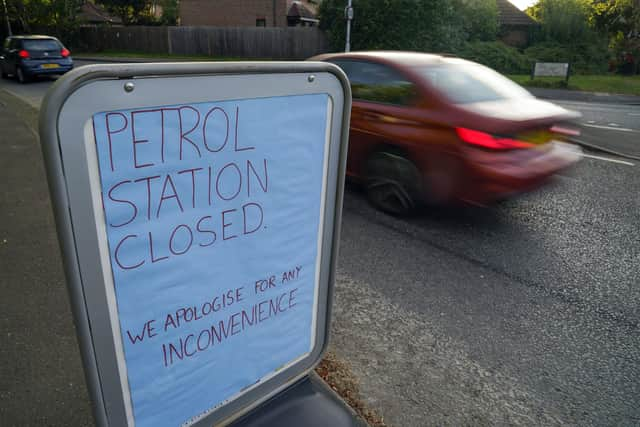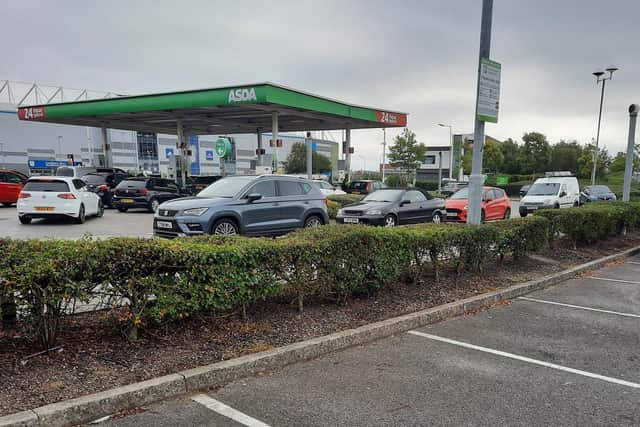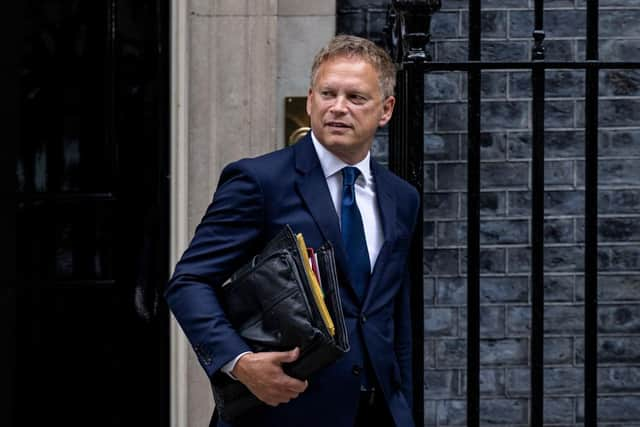Immigration rules to be relaxed as retailers warn there are 10 days to avoid Christmas disruption amid driver shortages
The British Retail Consortium (BRC) said that disruption to festive preparations will be “inevitable” if progress is not made to solve the shortfall of around 90,000 lorry drivers.
The stark warning came as BP, Esso and Tesco petrol forecourts were impacted by challenges getting petrol deliveries, and UK Government ministers met to discuss the crisis.
Advertisement
Hide AdAdvertisement
Hide AdAccording to reports, Prime Minister Boris Johnson has given the green light to the change in immigration rules to ensure it does not escalate further.
Home Secretary Priti Patel, who had argued such a move could lead to different industries demanding similar treatment, is also believed to have shifted her position amid fears of panic buying growing.
The Financial Times reported that one person close to the situation said the Prime Minister had issued instructions as he “wants this solved”.
Downing Street confirmed last night the Government is considering temporary measures to tackle the shortage of HGV drivers but insisted that any measures introduced would be “very strictly time-limited”.
Earlier, Transport Secretary Grant Shapps promised to “move heaven and earth” to get the situation solved.


A Downing Street spokesperson said: “We have ample fuel stocks in this country and the public should be reassured there are no shortages.
“But like countries around the world we are suffering from a temporary Covid-related shortage of drivers needed to move supplies around the country.
“We’re looking at temporary measures to avoid any immediate problems, but any measures we introduce will be very strictly time-limited.


Advertisement
Hide AdAdvertisement
Hide Ad“We are moving to a high-wage, high-skilled economy and businesses will need to adapt with more investment in recruitment and training to provide long-term resilience.”
Petrol stations closed
BP said that around 20 of its 1,200 petrol forecourts were closed due to a lack of available fuel, with between 50 and 100 sites affected by the loss of at least one grade of fuel.
A “small number” of Tesco refilling stations have also been impacted, said Esso owner ExxonMobil, which runs the sites.


Mr Shapps has tried to dissuade drivers from panic buying petrol, although there have been chaotic scenes at petrol stations across the country, including across Scotland. He said yesterday that motorists should “carry on as normal”.
“The advice would be to carry on as normal, and that is what BP is saying as well,” Mr Shapps said.
Senior ministers were locked in a meeting yesterday afternoon to discuss possible solutions, with using the Army to drive tankers also said to be udner consideration.
Andrew Opie, director of food and sustainability at the BRC, said: “HGV drivers are the glue which hold our supply chains together. Without them, we are unable to move goods from farms to warehouses to shops.
“Currently, the UK faces a shortfall of around 90,000 HGV drivers and it is consumers who ultimately suffer the consequences.
Advertisement
Hide AdAdvertisement
Hide Ad“Unless a solution can be found in the next 10 days, it is inevitable that we will see significant disruption in the run-up to Christmas.”
HGV drivers currently do not meet the skills threshold to qualify for work visas in the UK under the government’s new points-based system.
The government has also rejected previous calls to offer temporary visas to foreign drivers in a bid to help fill vacancies.
Around 20,000 EU drivers returned home during the pandemic according to industry estimates, but a further 50,000 British drivers with HGV licences also stopped working during the past 18 months.
Mr Shapps denied that Brexit was the culprit in the UK's recent shortage of lorry drivers, arguing that the split from the European Union had helped the government react.
He said there had been a “systematic shortage of drivers” for a “long time”, noting that many drivers had left the sector due to low wages caused in part by importing labour from abroad.
However concerns remain over whether many European drivers will come to Britain when there are already shortages in continental Europe.
At a meeting a week ago, BP reportedly told the Government that the company was struggling to get fuel to its forecourts.
Advertisement
Hide AdAdvertisement
Hide AdIts head of UK retail Hanna Hofer described the situation as “bad, very bad”.
BP had “two-thirds of normal forecourt stock levels required for smooth operations”, she said, adding that the level is “declining rapidly”.
The AA has said that most of the UK’s forecourts are working as they should.
“There is no shortage of fuel and thousands of forecourts are operating normally, with just a few suffering temporary supply chain problems,” said AA president Edmund King.
“Fridays and the weekend always tend to be busier on forecourts as drivers either combine filling up with shopping runs, prepare for weekend trips or refuel for the start of the new working week.
“Drivers should not fill up outside their normal routines because, even if the occasional petrol station is temporarily closed, others just down the road will be open.
“It is now clear that there have been occasional delays over recent weeks that have been managed with hardly anyone noticing. This was a manageable problem.”
Rod McKenzie of the Road Haulage Association trade body said that the Government had allowed the driver shortage to get “gradually worse” in recent months.
“We have got a shortage of 100,000 (drivers),” he said.
Advertisement
Hide AdAdvertisement
Hide Ad“When you think that everything we get in Britain comes on the back of a lorry, whether it’s fuel or food or clothes or whatever it is, at some point, if there are no drivers to drive those trucks, the trucks aren’t moving and we’re not getting our stuff.”
He added: “I don’t think we are talking about absolutely no fuel or food or anything like that, people shouldn’t panic buy food or fuel or anything else, that’s not what this is about.
“This is about stock outs, it’s about shortages, it’s about a normal supply chain being disrupted.”
More energy woe
Symbio became the latest energy supplied to stop accepting new customers yesterday as the turbulence that has rocked the sector and put many of its rivals out of business deepened.
The firm said "technical issues" have forced it to stop taking new customers for the time being.
The supplier, which was fined earlier this year by regulator Ofgem, is another in a long line to stop taking new energy customers, as soaring gas prices squeeze their finances.
Igloo, Ampower, Utilita and Neo Energy have all decided to stop taking customers recently, while a series of other suppliers have gone out of business.
The crisis is also hitting linked companies, such as auto-switching service Flipper, which automatically changes customers to the cheapest deal on the market.
Advertisement
Hide AdAdvertisement
Hide AdBut after these low-cost tariffs were removed, Flipper decided to close its doors, it announced on Thursday.
A message from the Editor:Thank you for reading this article. We're more reliant on your support than ever as the shift in consumer habits brought about by Coronavirus impacts our advertisers.
If you haven't already, please consider supporting our trusted, fact-checked journalism by taking out a digital subscription.
Comments
Want to join the conversation? Please or to comment on this article.
